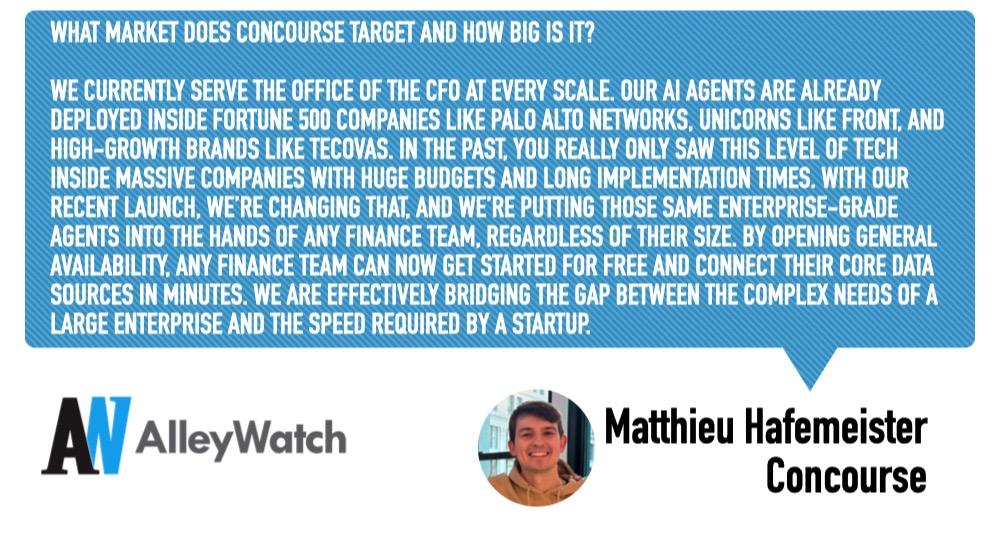#series-a-funding
#series-a-funding
[ follow ]
#ai-agents #cybersecurity-startups #vulnerability-management #ai-startups #healthcare-automation #agentic-ai
Startup companies
fromFood & Beverage Magazine
1 week agoWillie Nelson's Willie's Remedy+ Raises $15M to Take THC Drinks Nationwide: No Hangover, All Remedy - Food & Beverage Magazine
Willie's Remedy+ closed a $15M Series A, sold 400,000+ bottles, generated about $80M in under 12 months, and plans a national retail rollout in 2026.
Fundraising
fromBusiness Matters
1 week agoSidekick raises 7.8m Series A to scale private-bank style investing for professionals
Sidekick raised £7.8m Series A to expand access to private-banking-grade investment products, lending and cash management for professionals via a complexity-focused wealth platform.
Tech industry
fromTechCrunch
2 weeks agoExclusive: Apeiron Labs gets $29M to flood the oceans with autonomous underwater robots | TechCrunch
Apeiron Labs builds low-cost autonomous underwater vehicles that sample subsurface temperature, salinity, and acoustics, aiming to close ocean data gaps; raised $9.5M.
Startup companies
fromAlleywatch
2 weeks agoBoldVoice Raises $21M to Bring AI Voice Coaching to a Billion Non-Native English Speakers
BoldVoice provides affordable AI-powered phoneme-level pronunciation and accent coaching that improves communication clarity and career outcomes for non-native English speakers.
fromAlleywatch
4 weeks agoFlip CX Raises $20M to Expand AI That Automates 90% of Customer Service Calls
As enterprise AI spending surges past $100B annually, a critical divide has emerged: while billions flow into horizontal AI platforms promising to solve everything, enterprises deploying these tools face a harsh reality check when their generalist agents struggle with the complexity of real-world operations. The disconnect is particularly acute in customer service, where voice remains the highest-stakes channel where one wrong answer can cost thousands in revenue or irreparably damage customer relationships.
Artificial intelligence
Healthcare
fromBusiness Insider
2 months agoCheck out the exclusive pitch deck Valerie Health used to raise $30 million from Redpoint Ventures to automate healthcare faxes
Valerie Health automates referrals and scheduling for independent provider groups using AI and company staff to boost efficiency, revenue, and practice independence.
fromTechCrunch
2 months agoTitan OS raises $58 million from Highland Europe for its smart TV OS | TechCrunch
TV makers need to get more lifetime value from a customer after selling a unit. With more competition in the market, companies often need to sell TVs at a discounted price with lower margins. The best way for them to recover the money is by striking partnerships with channels, streaming services, and advertisers. This is the core thesis around Barcelona-based Titan OS, which provides a smart TV operating system to TV makers with a promise to get better lifetime value out of the customer.
Television
Privacy technologies
fromBusiness Insider
3 months agoThe AI startup lawmakers consulted on TikTok's and DeepSeek's privacy risks raised $14 million. Read its pitch deck.
Feroot uses AI agents to scan websites and apps for compliance with over 50 privacy laws, preventing legal risk and accelerating audits for startups.
Startup companies
fromTechCrunch
3 months agoAs consumers ditch Google for ChatGPT, Peec AI raises $21M to help brands adapt | TechCrunch
Peec AI provides brands tools to monitor and optimize visibility, sentiment, and source attribution in AI-powered search, fueling rapid customer growth and a $21M Series A.
fromTechCrunch
3 months agoCluely's Roy Lee hints that viral hype is not enough | TechCrunch
While Roy Lee, the founder of Cluely, argues that startups should be thinking harder about social media virality, he also admits that brand awareness alone won't lead to sustained growth. "I can't say if it's a mistake, but maybe we launched too early," Lee said on stage at TechCrunch Disrupt 2025 last week. "The whole idea [was] let's launch something that barely works, and if we can get enough initial users, they will find out the use cases for us."
Startup companies
fromTechCrunch
4 months agoKnapsack picks up $10M to help bridge the gap between design and engineering teams | TechCrunch
That's where Knapsack comes in. It's a collaboration platform specifically designed for enterprises that need to resolve misunderstandings between UI designers, product managers, and engineers. Knapsack creates a unified workspace that connects with tools like Figma and Git, ensuring that any design changes are automatically updated in the code and documentation. This approach makes sure that everything remains up to date, so branding stays consistent across all digital products.
Startup companies
fromInsideEVs
4 months agoThis Affordable, Mini-Sized Electric Truck Just Got Closer To Reality
The low-cost and tiny MT1 is a very different kind of electric pickup from the likes of the Ford F-150 Lightning and Rivian R1T. It's almost like an updated version of the imported Japanese kei trucks that have popped up across the country. It's designed for weekend warriors who live in urban environments and want some pickup capability-a market that is indeed underserved today.
Startup companies
Artificial intelligence
fromFortune
5 months agoCuspAI, startup building AI models for chemistry, raises $100 million Series A | Fortune
CuspAI raised $100 million in Series A funding at a $520 million valuation to develop AI-driven chemistry models for novel materials and sustainable energy applications.
fromAlleywatch
5 months agoCassidy Raises $10M to Scale Context-Powered AI Automation for Non-Technical Teams
In an enterprise landscape where AI adoption has stalled in pilot programs and organizations struggle to move beyond experimental use cases, businesses need automation solutions that deliver measurable ROI rather than theoretical benefits. Most AI tools require extensive technical resources and fail to capture the nuanced, company-specific processes that drive real business value. Cassidy addresses this challenge by empowering non-technical teams to build and deploy context-powered AI workflows that understand their unique business processes, institutional knowledge, and brand voice.
Artificial intelligence
fromSilicon Valley Journals
5 months agoHello Patient Raises $22.5M Series A to Transform Healthcare's "Front Door" with Conversational AI
The company is tackling one of healthcare's most persistent problems: access. Known as the "front door" of healthcare, communication and scheduling systems often determine whether patients can actually secure timely care. Across the U.S., as many as 42% of patient calls and texts go unanswered during peak hours, largely due to staffing shortages and overburdened call centers. This leads to delays in care, missed appointments, and revenue loss for practices.
Healthcare
fromEntrepreneur
5 months agoAI Startup Aurelian Raises $14 Million For 911 Call Centers | Entrepreneur
A new AI startup pivoted from automating appointment bookings for hair salons to building an AI voice assistant that handles non-emergency calls for 911 call centers - and it just raised a $14 million Series A for its new focus on Wednesday. Max Keenan, the founder of Y Combinator-backed startup Aurelian, decided to pivot the company in response to a call from one of his clients, reports TechCrunch. The client, a hair salon owner, had a problem with a school's carpool lane blocking the salon's parking lot.
Startup companies
[ Load more ]






